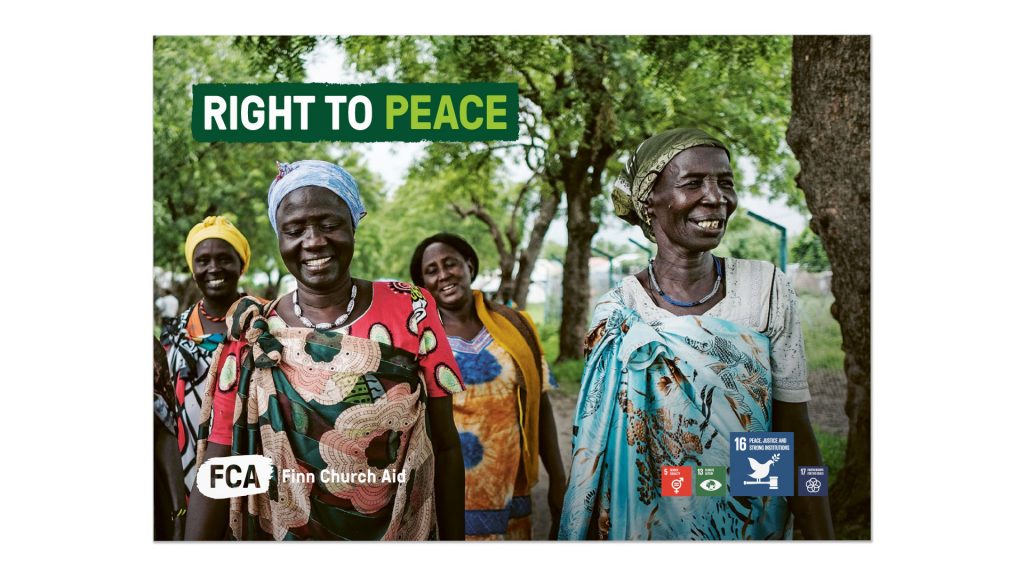RIGHT TO Peace
RIGHTTOPeace
Peace is a prerequisite to just and resilient societies. By working for the Right to Peace, we empower people and local communities in fragile situations to contribute positively to preventing conflict, building sustainable peace and strengthening structures that support peace at all levels of society.
We believe that community ownership, where the stakeholders themselves lead peace efforts, is the best way to achieve positive development and stability. In our peace work, we:
- facilitate horizontal and vertical dialogue for peace between right-holders and duty-bearers
- promote the role of women, youth and traditional and religious leaders in peace processes
- facilitate peace and reconciliation training and enable communities to prevent conflicts
- engage with international processes for global impact and link them to local efforts
- develop methodologies and support consensus building among UN member states regarding the Declaration on the Right of Peoples to Peace
We build peace in some of the world’s most fragile countries, including the Central African Republic, South Sudan, Kenya, Uganda, Somalia, Myanmar, Nepal, and Cambodia. These countries face additional challenges regarding sustainable development that we often address through the triple nexus approach, where we integrate peacebuilding in urgent humanitarian responses and long-term development cooperation. We also support peace-related work in Israel and the Occupied Palestinian territories.
Supporting peace work in local communities
Women, youth, and refugees and religious and traditional actors are at the heart of our peace work. We support local communities by:
- training religious and traditional leaders in becoming effective peace builders
- helping communities to create conflict-solving mechanisms and initiatives
- supporting communities in influencing national and international peace processes
 883
883
In 2020, we trained 883 officials and decision-makers on anti-mutilation laws, children’s rights and mediation in Kenya.
Somali peace process
Our baseline study indicates that in fragile states, such as Somalia, traditional and religious networks are widely seen as having the capacity, and public trust, to find solutions for sustainable peace.
One of our success stories is our support for the Somali peace process. FCA has put great effort into empowering religious and traditional leaders and women in the peace and state-building work of Somalia.
Our efforts to link the Somali elders more closely with Somali authorities and the UN have been successful. We have opened channels for inclusive participation in politics, based on universal human rights and gender equality.
Further reading
FCA contributing to profound shift in women’s political participation in Somalia, published 16.6.2021
Knowledge Management Central in Advancing Inclusive Local Governance in Somalia, published 7.7.2021
The Network for Religious and Traditional Peacemakers
We host the secretariat of The Network for Religious and Traditional Peacemakers, a network which we co-founded in 2013 at the request of the UN. The Network responds to the growing awareness that religious and traditional authorities are vital but underutilised actors in peace processes.

The Network’s objective is to improve the effectiveness and sustainability of international and local mediation efforts through strengthening local ownership and supporting the positive role of religious and traditional leaders in mediation and peacebuilding.
Activities of the Network include assignments to consult, mobilise and facilitate contacts with the religious and traditional leaders, and carry out baseline assessments; convene task forces with thematic focuses; train UN and state mediators and religious and traditional leaders. The Network emphasises gender, provides channels to support female religious and traditional leaders, and sensitises men to the issues of women’s rights and the benefits of non-discrimination and the inclusion of women.
The Network for Religious and Traditional Peacemakers was initiated in 2013 as a direct result of UN Secretary General Ban Ki-moon’s report titled “Strengthening the role of mediation in the peaceful settlement of disputes, conflict prevention and resolution” (UN GA Report A/66/811, 2012) and the supporting guidance titled “UN Guidance for Effective Mediation” (UN GA Resolution 65/283, 2012). The Network is guided by a Steering Group comprised of the UN Mediation Support Unit, UN Alliance of Civilizations, UN Office on the Prevention of Genocide, UN Women, UN Population Fund, UN Development Program, Ministry for Foreign Affairs Finland, Sultanate of Oman, Finn Church Aid, Religions for Peace, KAICIID and the Organization of Islamic Cooperation.
